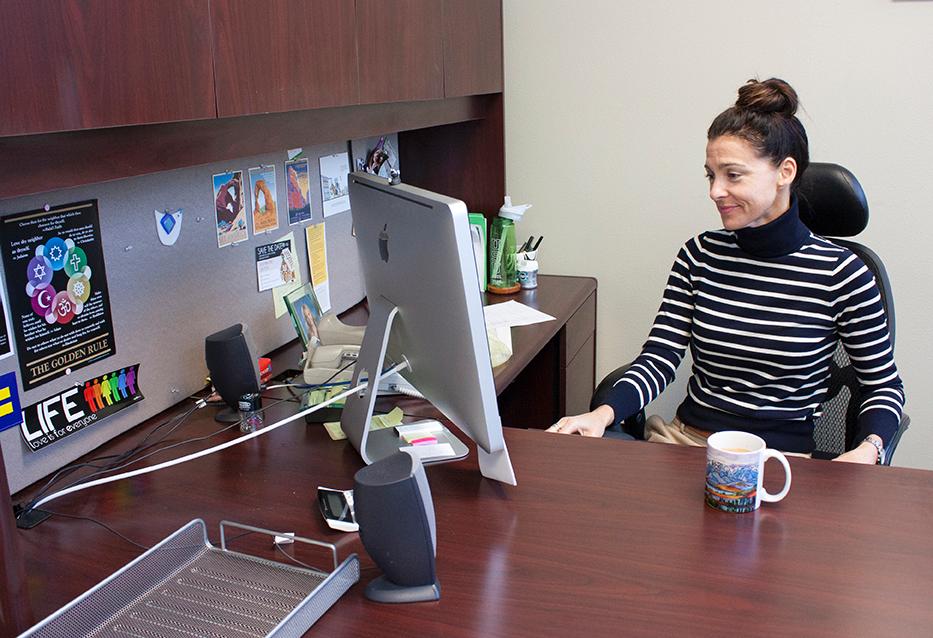Professer asks students how they feel about faith diversity
An anthropology professor is starting a study of the spiritual and religious diversity environment on campus by interviewing students about their religious experiences.
It is Bonnie Glass-Coffin’s hope that the study will reveal what programs the university should develop to promote religious diversity on campus.
“We want to ask students, faculty, staff and administrators about our particular campus climate, so we know the right kinds of programs to develop,” she said.
During the interview, students are asked how they feel about religious and spiritual issues, if they feel their spiritual needs are being met, and how others view their religion, according to Glass-Coffin. She wants to know if there is a desire for conversations crossing lines of religion in the public university setting.
“We have a lot of history, expertise, people and offices who are committed to creating a climate of diversity, safety, inclusion and support for many kinds of diversity on campus,” Glass-Coffin said. “But we don’t have any history talking about religious diversity.”
Glass-Coffin wants to improve students’ religious literacy and their ability to have difficult discussions with those of a different background, especially in today’s diverse and conflict-filled world.
Michelle Bogdan, director of the Access and Diversity Center, believes it is important for Student Services to not only promote cultural, racial, ethnic and sexual orientation diversity, but also spiritual diversity amongst faith-based and non-believers.
“Academics is part of your experience as a college student, but you have a lot of other experiences outside of the classroom that are going to form a lot of your belief and perspective when you graduate and go on to your career,” she said.
Ivy Bias is a freshman majoring in biology who doesn’t identify herself as religious. She has found the culture at USU is predominantly LDS, and said she believes it’s important for USU to create a more open environment.
“I think it would encourage people to think for themselves instead of just listening to what their parents tell them,” she said.
Glass-Coffin said one concern about the study is it would be just another opportunity to bash Mormons, but the research is for everyone, both the minorities and the majority. She said even though LDS students are the majority, they still sometimes feel like professors bash their religion.
“Everything is being done to ensure all voices are being heard, from Mormons to atheists,” she said. “Questions of spirituality concern everyone.”
Bogdan said any program they implement will be ineffective if there is exclusion.
“The most important thing that we need to consider when we’re doing this work is to ensure that everyone is welcome to the table,” she said.
This is an opportunity for those who don’t usually feel included to find their voice and for those who feel like they’re the majority to find common ground with others, she said.
Glass-Coffin described one aspect of the study as “asset mapping,” finding what resources are already in place for students, such as the religious studies program and the InterFaith House, and also determining where the best place would be for deeper, more spiritual discussions. It’s unclear whether it would be better to have them inside or outside classrooms, according to Glass-Coffin.
Bogdan believes there is space both within and without the classroom, but only if it pertains to the course material, and never where the material is being slanted toward one viewpoint.
“Because we are a publicly funded university, we as a university don’t want to promote one particular religious view over another,” Bogdan said.
Because she was concerned about accusations of making students feel excluded, Bogdan wasn’t always supportive of religious movements on campus.
“I’ve always just thought we should keep the whole religious thing as hands-off, but in my research and my study, religious development is a part of student development theory, and as a student services professional, it is my job to understand the whole student and belief systems are a part of that,” she said.
Glass-Coffin is still looking for students who would like to be interviewed, and interested students can email her at bonnie.glass-coffin@usu.edu.
“We’d really love to hear every voice,” she said.
@BurnettMaile

